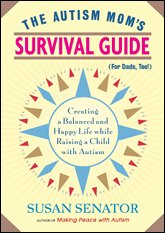Susan Senator
All happy families are not alike...

A happy life consists not in the absence, but
in the mastery of hardships.
—Helen Keller, “The Simplest Way to Be Happy”
When my son Nat was diagnosed with autism at the age of three, I had no idea how much autism was going to force me to change: how I parented, how I made plans, who I hung out with, how I felt about family, how I felt about my life. Those changes were huge and fraught with emotion and intensity. We didn’t know what to tackle first—finding him a school program, educating ourselves, finding specialists for him and for us—but we realized fairly quickly that we had to do all of these at once.
“How can I bear it?” I wrote in my journal a few months after diagnosis. “Nat is being called a ‘special ed’ kid, the very thing I dreaded. If I let everyone else decide that is what he is, I feel like I’m giving up on him. I see myself as his last hope.”
Back then I thought that if I accepted his diagnosis, it would make Nat’s condition worse. I feared that it would change how we all saw him and treated him, in a way that would be harmful to him. This may have been magical thinking, but it is what I felt at the time.
I eventually realized that I had to let go of the old idea of him, of the prediagnosis innocence, and the visions I had of him that never really matched who he was…
…How do we get to the blessed point where we finally step back and understand deeply that our children are whole, not broken? And that our own lives, by extension, are also whole and full of potential? In talking to parents, I learned that achieving this knowledge has nothing to do with our age, our child’s age, or the severity of our child’s problems; nor does it have to do with income, race, or any other factors we usually think of.
Copyright 2010, Susan Senator